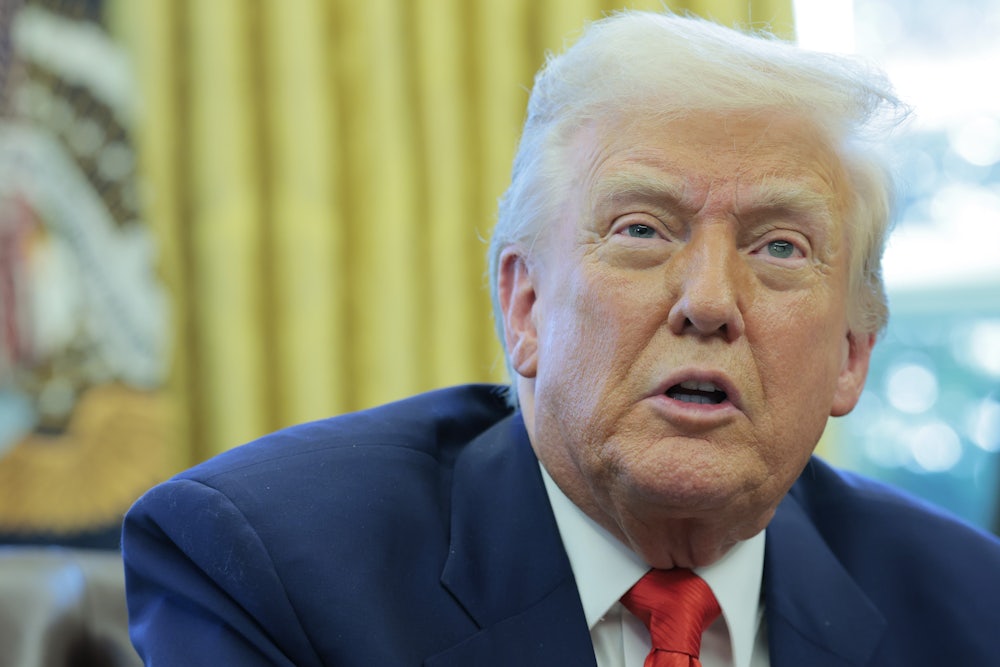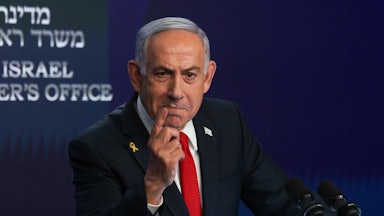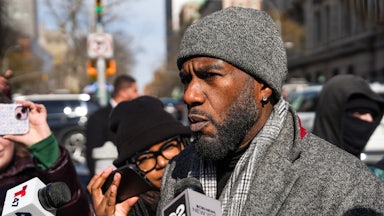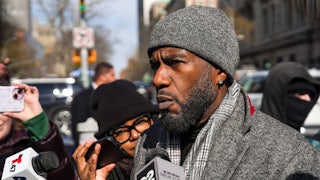As Trump administration officials seek to defend their refusal to return Kilmar Abrego Garcia to the United States after deporting him in “error,” one of the government’s chief justifications has been that he was a member of the MS-13 gang. One Trump official after another has lodged the charge, though Abrego Garcia denies this and the evidence for it is conspicuously thin.
This notion—that Abrego Garcia posed a major public safety threat inside the U.S.—has become Trumpworld’s primary excuse for denying him basic due process and leaving him in a maximum security prison in El Salvador known for human rights abuses. This includes apparently defying the Supreme Court’s recent order to “facilitate” his return: On Monday, when a reporter asked Trump if he’ll follow this directive, Trump snarled: “Why don’t you just say, ‘Isn’t it wonderful that we’re keeping criminals out of our country?’”
But the administration’s case that Abrego Garcia is a gang member and violent criminal is running into more trouble.
The Maryland police officer who formally attested to Abrego Garcia’s supposed gang affiliation in 2019—when he was detained the first time—was subsequently suspended from the force for a serious transgression: giving confidential information about a case to a sex worker, The New Republic has established.
This officer—apparently a senior detective on Abrego Garcia’s case in 2019—is named Ivan Mendez, according to information provided by Abrego Garcia’s lawyer at the time, Lucia Curiel, who is also a member of his current legal team. Mendez was subsequently indicted for this offense, pleaded guilty, and received probation.
By itself, of course, this does not settle whether Abrego Garcia was ever in MS-13. But it buttresses the argument that the process designating him a gang member was shoddy and riddled with flaws from the outset. Abrego Garcia and his lawyers have argued that both local law enforcement and the Trump administration rushed to pin this gang affiliation on him based on evidence that was thin to nonexistent, and the suspension of this officer for such a serious offense makes that case more plausible.
These new details also help illuminate some of the lingering unknowns about this whole saga.
Abrego Garcia—a Salvadoran who came to the United States illegally in 2011, at the age of 16—was initially detained in Prince George’s County, Maryland, a suburb of Washington, D.C., in March 2019. County police asked him whether he was a gang member, which he denied.
Abrego Garcia was not charged with a crime, and on the basis of his undocumented status was transferred to Immigration and Customs Enforcement, which moved to deport him. Abrego Garcia sought asylum, and during those proceedings, ICE claimed Abrego Garcia was a member of MS-13.
To support this claim, ICE relied on what’s known as a Gang Field Interview Sheet, supplied by the Prince George’s County police. It claimed that Abrego Garcia wore a Chicago Bulls hat and hoodie, that this was evidence of membership in MS-13, and that a “confidential source” had related that he was a member of the gang’s Westerns clique. But that operates in New York, where he never lived.
In the 2019 proceedings, an immigration judge ultimately granted Abrego Garcia “withholding of removal,” which barred his transfer to El Salvador on grounds that he’d face harm there. This is the status the Trump administration knowingly ignored by deporting him to that country in March, which the Supreme Court has now declared “illegal.” (The administration claims it has no obligation to return him, a case that falls apart under scrutiny.)
Abrego Garcia’s lawyers recounted some of that 2019 story in current court filings, but in them, they also added some details that raise additional questions. They claimed that at the time, his lawyer, Curiel, sought more information from the P.G. County police but was informed that the lead detective on his case had been “suspended.” The current filings don’t name the officer, and they don’t say why he was suspended.
But we can fill in the facts around some of these cryptic details.
Ivan Mendez was the officer who filled out this gang interview sheet, according to a copy of the sheet itself, which we obtained from Curiel. And Curiel tells us that repeated conversations with the P.G. County police inspector general confirmed that Mendez was a lead detective on Abrego Garcia’s case.
What’s more, it turns out that Mendez was suspended, in early April 2019, for “providing information to a commercial sex worker who he was paying in exchange for sexual acts.” That’s according to the P.G. County police’s own announcement of his indictment, which came a year later, in June 2020. Strikingly, the information Mendez shared was related to “an on-going police investigation.”
“This is clearly not an officer that respects the rules and protocols,” Curiel told us. “If he’s willing to do that, what else is he willing to do?”
Mendez ultimately pleaded guilty to the charge and received probation, according to the office of Aisha Braveboy, the state’s attorney for Prince George’s County. The office also confirmed Mendez’s police ID number, which matches the one on the gang sheet. The P.G. County police declined comment, but the department appears to have acted on this misconduct efficaciously.
All this raises more questions about the integrity of the process by which Abrego Garcia has been deemed a gang member, even as Trump and his minions have been extraordinarily cavalier in throwing around the MS-13 smear.
Vice President JD Vance, for instance, has asserted that Abrego Garcia was a “convicted MS-13 gang member.” The basis for that is that during the 2019 litigation, Abrego Garcia was denied bail at an early stage. But as Roger Parloff details, this is a very weak evidentiary basis. Abrego Garcia was not even charged with, let alone convicted of, any crime related to gang membership, or any crime at all.
White House press secretary Karoline Leavitt, meanwhile, has insisted that there’s a “lot of evidence” of Abrego Garcia’s MS-13 membership, and has even claimed he was involved in human trafficking. Top Trump adviser Stephen Miller and Homeland Security Secretary Kristi Noem have also loudly echoed these charges.
But not only is the existing evidence of this criminality exceedingly thin; we’ve now learned that the officer who attested to it was suspended very soon after for serious professional misconduct, suggesting the whole process may have been even more dubious than previously known.
Abrego Garcia appeared to be settling into his life in Maryland. He is married to a U.S. citizen and has three children, including one with autism, and he’d been working as a sheet metal worker and taking classes at the University of Maryland.
But it bears stressing that even if real evidence of Abrego Garcia’s criminality were to emerge, his removal is still illegal, and he is still entitled to due process in the United States. If the administration wanted to deport him, it could have simply mounted another legal challenge to his “withholding of removal” status, or sought to deport him to a country other than El Salvador, which that status does not preclude. The administration still has the option of bringing him back and retrying him for removal through these conventional lawful channels.
Why officials refuse to do this remains unanswered. And now that further doubt has been cast on the procedures by which Abrego Garcia was designated a gang member in the first place, the whole affair looks even more sordid and indefensible.






